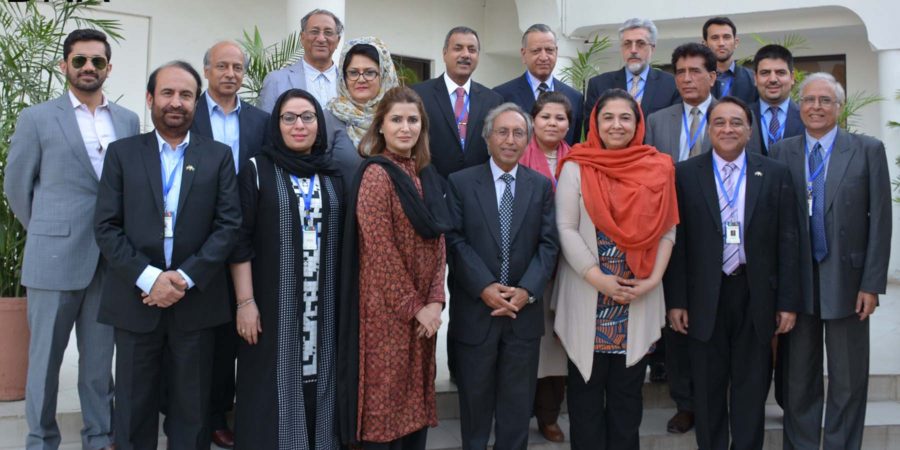First Pak-Afghan dialogue facilitated by CRSS/WPSO

LAHORE (DNA) –An expanded commitment to peace and security in the region, the role of media in fostering this goal, border management, and refugees were the top items on the agenda of the first meeting of the second phase of Beyond Boundaries, a Track I.5/II dialogue series undertaken by the Center for Research and Security Studies (CRSS) in partnership with Afghan counterpart Women Peace and Security Organization (WPSO).
The series brings together from both countries prominent journalists, civil society activists, former diplomats, parliamentarians, academicians, former members of law enforcement and scholars as part of the Pakistan-Afghanistan Joint Committee (PAJC) for Beyond Boundaries phase II. The Pakistani contingent comprised Dr. Shoaib Suddle, Maj. Gen. (retd) Ejaz Awan, Ambassador Mian Sanaullah, Muhammad Tahir, and MNA Shazia Marri, while the Afghan delegation comprised Sayed Ishaq Gailani, Mozammil Shinwari, Wazhma Frogh, Palwasha Hassan, Ketabullah Khpolwak Sapai, and Elay Ershad. The workshop was chaired by Dr. Rasul Baksh Rais.
Speaking at the session, Elay Ershad, Member of the Oolasi Jirga (lower house of parliament) said every Pakistani and Afghan one is part of a puzzle which will be complete only if all of us work together. She said that members of media and the civil society should not resonate their respective government’s positions. We should come out of that mindset and propose our own independent thinking.
Dr. Rasul Baksh Rais, eminent professor at LUMS, said that initiatives such as Beyond Boundaries are extremely important in a difficult geo-political environment and in view of the complicated bilateral relations. Governments usually lack vision, courage, and readiness for change and therefore it is the job of independent thinkers and think tanks to redirect the bilateral relationship.
Syed Ishaq Gailani, a former MP and presidential candidate, bemoaned the latest visa restrictions such as no permission for entry into Cantonment areas as well as the treatment being meted out to the Afghan refugees.
While discussing various themes of bilateral importance, the group deliberated on a list of policy recommendation for both governments, which are as under.
Security and Peace
Peace and stability is the priority of the two nations. Disengagement, therefore, between the two governments is not desirable. The high-level exchanges should be resumed in order to promote dialogue at all levels to generate conducive environment for removing mistrust.
The Quadrilateral Coordination Group (QCG) should be revived, and it should continue to encourage the Taliban to come to the negotiation table, to adhere to well-defined, measurable goals and steps indicating progress.
Terrorism is a common concern, which continues to affect families on both sides. Effective regulatory framework is needed to check movement of goods and people on both sides, beginning with the regulation of existing crossing points, and gradually extending it to other entry and exit points.
Media
Media plays a major role in shaping relations and public perceptions with far reaching implications. In this context, both sides supported facilitating exchanges of media people, and formulation of shared code of conduct to regulate media communication. Furthermore, ban/block on print/electronic media should be lifted. In response to official request by TV channels, PEMRA should give concessional landing rights to facilitate viewing of Afghan channels in Pakistan. Media should foster younger, more neutral, more progressive voices on-air to mitigate the mutual vitriol generated by brinkmanship and jingoism. Efforts should be made to encourage joint media productions by state and private TV channels to promote a culture of peace and understanding.
Visas
Both the governments should further simplify visa procedures and regulations for bona fide business people, students, and parliamentarians. Special counters offering speedy processing should be set up in respective embassies to facilitate visas to medical tourists and disabled persons.
Education
In view of interest for education in Pakistan, it is strongly recommended that the government of Pakistan should increase the number of existing scholarship to Afghan students. Further, the grant of scholarships should be routed through ministry of higher education and concerned Pakistani authorities.
Culture and Sports
Both countries enjoy shared culture and enjoy similar sports. Keeping in view the positive contribution of sports and culture in promoting peace and stability, it was recommended that both the countries should organize cricket matches between national and regional teams. Also, the state TV channels, on reciprocity basis may telecast regularly cultural events.
Trade
The existing Afghanistan-Pakistan Transit Trade Agreement (APTTA) renegotiation should not be delayed any further. In the meanwhile, in order to reduce cost of transit trading, custom processing should be expedited to promote connectivity among Afghanistan, Pakistan, India, and central Asian republics. Trading in food items including perishable commodities should be treated as a priority.
Refugees
The repatriation of refugees should not entail unnecessary hardship and harassment. As announced by the government of Pakistan, refugees must be allowed to return with dignity and honor, with their belongings and assets. The government should consider the hard climate conditions in Kabul and therefore, should extend the deadline for repatriation to warmer months.
The second meeting of PAJC will be held November 13-17 in Herat and Kabul, Afghanistan.
Contact:
Related News

Mohsin Naqvi’s leadership accelerates development across Islamabad
ISLAMABAD, FEB 20 /DNA/ – Mohsin Naqvi has emerged as a man of action whoseRead More

5.6-magnitude earthquake jolts Islamabad, Pindi, parts of KP
ISLAMABAD, FEB 20: A 5.6-magnitude earthquake struck parts of Khyber Pakhtunkhwa (KP) and Punjab onRead More


Comments are Closed